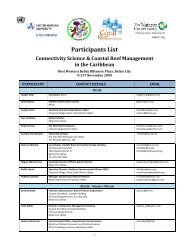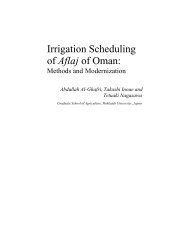The Global Water Crisis: Addressing an Urgent Security - Unu-inweh ...
The Global Water Crisis: Addressing an Urgent Security - Unu-inweh ...
The Global Water Crisis: Addressing an Urgent Security - Unu-inweh ...
Create successful ePaper yourself
Turn your PDF publications into a flip-book with our unique Google optimized e-Paper software.
2. <strong>Water</strong> in the WANA Region<br />
2.1. Demographic <strong>an</strong>d economic conditions<br />
Currently, the total population of the WANA region st<strong>an</strong>ds at about 500 million (UNDP, 2008; World B<strong>an</strong>k, 2007). <strong>The</strong><br />
average <strong>an</strong>nual rate of population growth is 2.6%, although it varies from one country to <strong>an</strong>other. <strong>The</strong> highest growth<br />
rate is 6.5% in the United Arab Emirates (UAE) <strong>an</strong>d the lowest is 1.1% in Ir<strong>an</strong>. <strong>The</strong> urb<strong>an</strong> proportion of the total population<br />
is 55%, although it varies widely between states <strong>an</strong>d is at more th<strong>an</strong> 80% in Bahrain, Djibouti, Jord<strong>an</strong>, Kuwait, Leb<strong>an</strong>on,<br />
Libya <strong>an</strong>d Saudi Arabia, <strong>an</strong>d less th<strong>an</strong> 40% in Comoros, Somalia <strong>an</strong>d Yemen. <strong>The</strong> average gross domestic product (GDP)<br />
in the Arab states is US $1.043 billion, or US $1.915 billion in terms of purchasing power parity (PPP). <strong>The</strong> corresponding<br />
per capita values are US $3,659 <strong>an</strong>d US $6,716, respectively. However, these averages hide the fact that the GDP per<br />
capita is signific<strong>an</strong>tly higher in oil states compared to non-oil states. For non-oil states, the per capita GDP varies between<br />
US $700 <strong>an</strong>d US $1,800, while the highest GDP of the oil states is US $6,716. <strong>The</strong> average Hum<strong>an</strong> Development Index<br />
(HDI) scores low at about 0.7, with 13 of 26 countries above this average. Although data on the Hum<strong>an</strong> Poverty Index is<br />
limited, the average rate of poverty is 38%. Poverty values of less th<strong>an</strong> 10% are reported for Jord<strong>an</strong>, Leb<strong>an</strong>on, Qatar <strong>an</strong>d<br />
UAE (UNDP, 2008).<br />
2.2. <strong>The</strong> sharing of water resources<br />
M<strong>an</strong>y of the countries in the WANA region share their primary surface <strong>an</strong>d underground water resources. <strong>The</strong> UNDP<br />
2006 Hum<strong>an</strong> Development Report (HDR) states that Iraq <strong>an</strong>d Syria obtain between 50-75% of their water from rivers<br />
outside their national borders, while Egypt gets 75% of its water from outside its borders (UNDP, 2006). As stated in the<br />
HDR: “M<strong>an</strong>aging shared water c<strong>an</strong> be a force for peace or for conflict, but it is politics that will decide which course is<br />
chosen” (UNDP, 2006: 203). If no action is taken or efforts are made to enable cooperation, tension over water is likely<br />
to increase in the future.<br />
<strong>The</strong> sharing of water resources between nations in the region underlines not only the import<strong>an</strong>ce of knowledge sharing,<br />
underst<strong>an</strong>ding regional groupings <strong>an</strong>d common approaches to IWRM, but equally the import<strong>an</strong>ce of international legal<br />
frameworks that codify interaction <strong>an</strong>d c<strong>an</strong> both enable <strong>an</strong>d inhibit cooperation over resources. More often th<strong>an</strong> not, water<br />
is treated legally at a national level, <strong>an</strong>d it is this mentality that must be ch<strong>an</strong>ged if water m<strong>an</strong>agement is to be addressed<br />
between nation-states. International instruments, such as the UN <strong>Water</strong>courses Convention, c<strong>an</strong> serve as a precedent<br />
for legal cooperation between states. For example, UN Resolution A/RES/63/124 on tr<strong>an</strong>sboundary aquifers (United<br />
Nations General Assembly, 2009) is a non-binding agreement between states that “encourages the States concerned to<br />
make appropriate bilateral or regional arr<strong>an</strong>gements for the proper m<strong>an</strong>agement of their tr<strong>an</strong>sboundry aquifers, taking<br />
into account the provisions of these articles” (United Nations General Assembly, 2009: 1). Based on such international<br />
legal precedence, there exists the possibility for states to cooperate at a regional level, supported by international legal<br />
frameworks that c<strong>an</strong> be developed <strong>an</strong>d built upon in unison. <strong>The</strong> legal frameworks that exist in Europe, such as the<br />
D<strong>an</strong>ube River Basin or the EU <strong>Water</strong> Framework Directive that regulates all member countries (Kaika, 2003), c<strong>an</strong> also<br />
serve as examples of political-economic integration at <strong>an</strong> institutional level, developing the necessary legal frameworks<br />
that facilitate cooperation over various resources.<br />
<strong>The</strong> regional dimensions of water m<strong>an</strong>agement c<strong>an</strong> be better served by improved communication between water experts<br />
<strong>an</strong>d policy-makers <strong>an</strong>d diplomats in a m<strong>an</strong>ner that is both comprehensible <strong>an</strong>d politically practical. Science must inform<br />
decision-makers of the factual <strong>an</strong>d academic-led dimensions of water security to help them make better decisions, while<br />
decision-makers have a responsibility to inform scientists of the practical realities <strong>an</strong>d guid<strong>an</strong>ce needed to realize ch<strong>an</strong>ge<br />
at the policy level. Fundamental, sweeping ch<strong>an</strong>ge c<strong>an</strong> only come about through cooperation between science <strong>an</strong>d politics<br />
that works in unison with societal ch<strong>an</strong>ge.<br />
3. <strong>The</strong> WANA Forum: <strong>Water</strong> M<strong>an</strong>agement in the WANA Region<br />
At the consultative meeting for the West Asia <strong>an</strong>d North Africa (WANA) Forum in February 2010, water experts discussed<br />
regional challenges <strong>an</strong>d opportunities in water m<strong>an</strong>agement. <strong>The</strong>se include the necessary political <strong>an</strong>d legal frameworks,<br />
fin<strong>an</strong>cing, technology, <strong>an</strong>d institutional development, each of which is discussed briefly here. In each inst<strong>an</strong>ce, the<br />
<strong>Water</strong> <strong>an</strong>d Political <strong>Security</strong>: Conflict in West Asia <strong>an</strong>d North Africa<br />
Part 1<br />
49




